
Foot Loose & Fancy Free is the eighth studio album by Rod Stewart, released in November 1977 on Riva Records in the UK and Warner Bros in the US.
"That's What Friends Are For" is a song written by Burt Bacharach and Carole Bayer Sager.

"Theme from Mahogany" is a song written by Michael Masser and Gerry Goffin and produced by Masser. It was initially recorded by American singer Thelma Houston in 1973, and then by Diana Ross as the theme to the 1975 Motown/Paramount film Mahogany that also starred Ross. The song was released on September 24, 1975 by Motown Records as the lead single for both the film's soundtrack and Ross' seventh studio album, Diana Ross. Masser and Goffin received a nomination for Best Original Song at the 48th Academy Awards. Also, the song was nominated for AFI's 100 Years...100 Songs list constructed by the American Film Institute in 2004.
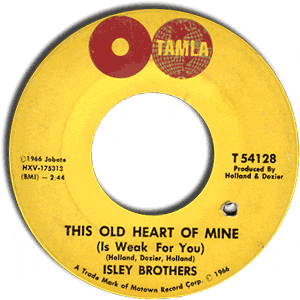
"This Old Heart of Mine (Is Weak for You)" is a Holland–Dozier–Holland song that was a hit for American musical group the Isley Brothers in January 1966 during their brief tenure on Motown's Tamla label. Featuring Ronald Isley on lead vocal, "This Old Heart of Mine" peaked at number twelve on the Billboard Hot 100, and at number six on the Billboard R&B Singles chart.

"The First Cut Is the Deepest" is a 1967 song written by British singer-songwriter Cat Stevens, originally released by P. P. Arnold in April 1967. Stevens's own version originally appeared on his album New Masters in December 1967.
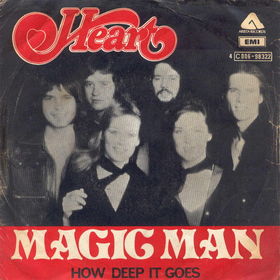
"Magic Man" is a song by the American rock band Heart released as a single off their debut album, Dreamboat Annie. Written and composed by Ann and Nancy Wilson, the song is sung from the viewpoint of a young girl who is being seduced by an older man, much to the chagrin of her mother, who calls and begs the girl to come home. In an interview, Ann Wilson revealed that the "Magic Man" was her then boyfriend, band manager Michael Fisher, and that part of the song was an autobiographical tale of the beginnings of their relationship. Roger Fisher came up with the alternative tuning EADGDG for his guitar part. The album version of "Magic Man" features an over-two-minute instrumental break which consists of a guitar solo and the usage of a Minimoog synthesizer, while the single version of the song edits out most of this break, cutting it down from 5:28 to 3:29.

"Thunder in My Heart" is a song by English-Australian singer Leo Sayer, from his fifth studio album, Thunder in My Heart (1977). The song was written by Sayer and Tom Snow, while produced by Richard Perry. It was released through Warner and Chrysalis Records in 1977, as the first single from the album. The disco song consists of a bassline and strings. "Thunder in My Heart" received generally positive reviews from music critics, who praised the production. It peaked at number 22 on the UK Singles Chart and at number 38 on the US Billboard Hot 100. A dance remix of the song by British disc jockey Meck titled "Thunder in My Heart Again" was released on 6 February 2006, and topped the UK Singles Chart.

"Hard Luck Woman" is a song by American hard rock band Kiss and the lead single from their 1976 album, Rock and Roll Over. It was originally written by Paul Stanley as a possible track for Rod Stewart, but after the success of the soft rock ballad "Beth", Kiss decided to keep it for themselves as a follow-up. Stanley has stated his admiration and love of Stewart's music numerous times, and that "Hard Luck Woman" was inspired by Rod Stewart, in particular the songs "Maggie May" and "You Wear It Well". While Stewart's music served as a partial inspiration for the song, the nautical themed song "Brandy" by American pop-rock band Looking Glass served as Stanley's main inspiration.

"How Long" is the debut single by the English band Ace, from their 1974 debut album, Five-A-Side. It reached No. 3 on both the US and Canadian charts, and No. 20 on the UK Singles Chart.
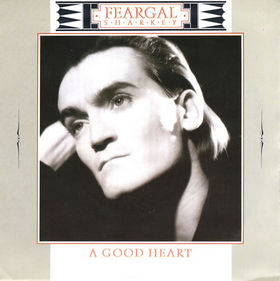
"A Good Heart" is a song written by Maria McKee and recorded by Northern Irish singer Feargal Sharkey, released as the first single from his self-titled debut album. It was released in September 1985 and became a number-one hit in the United Kingdom, Australia, Belgium, Ireland, and the Netherlands.

"Montego Bay" is a song co-written and performed by Bobby Bloom about the city in Jamaica of the same name. The song was a top ten hit for Bloom in the Fall of 1970 on both sides of the Atlantic. It reached No. 3 on the UK Singles Chart, No. 5 on the Canadian RPM 100 Singles Chart, No. 7 on the Australian Go-Set Singles Chart and No. 8 on the US Billboard Hot 100. The song was co-written and produced by Jeff Barry. In the master tape of the song, Bloom breaks into a chorus of "Oh, What a Beautiful Mornin'" at the end of the recording. The song features a whistler, as well as Jamaican instruments in a calypso style.
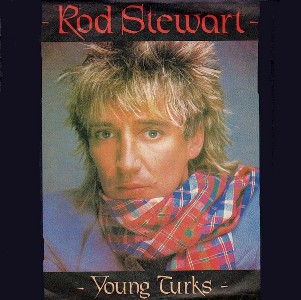
"Young Turks" is a song by Rod Stewart that first appeared in 1981 on his album Tonight I'm Yours. The track presented Stewart backed by a new synth-pop and new wave sound, in part influenced by acts like Devo. The term young Turk, which originates from the early 20th-century secular nationalist reform party of the same name, is slang for a rebellious youth who acts contrary to what is deemed normal by society. The phrase "young Turks" is not heard in the song, the chorus instead centering on the phrase "young hearts, be free, tonight", leading to the song frequently being known as "Young Hearts" or "Young Hearts Be Free".

"Rhythm of My Heart" is a song written by Marc Jordan and John Capek that was first recorded by Dutch rock and roll artist René Shuman, included on his 1986 self-titled debut album. In 1991, British singer Rod Stewart recorded the song for his album Vagabond Heart with production by Trevor Horn. It is the album's opening track and was released as its second single on 4 March 1991 by Warner.
"The Last Farewell" is a song by the British folk singer Roger Whittaker and Ron A. Webster. Whittaker hosted a radio programme in The United Kingdom, backed by an orchestra with arrangements by Zack Lawrence. Roger Whittaker said, "One of the ideas I had was to invite listeners to send their poems or lyrics to me and I would make songs out of them. We got a million replies, and I did one each week for 26 weeks."

"The Things We Do for Love" is a song by British band 10cc, released as a single in 1976. It later featured on the album Deceptive Bends released in 1977 and was the group's first release after the departure of band members Kevin Godley and Lol Creme.

"Gold" is a song written and recorded by John Stewart in 1979. It was the lead single and biggest hit among three Top 40 singles released from his LP, Bombs Away Dream Babies. The song was Stewart's first US Top 40 hit, as well as his first chart single in a decade. Stevie Nicks is featured on backing vocals.
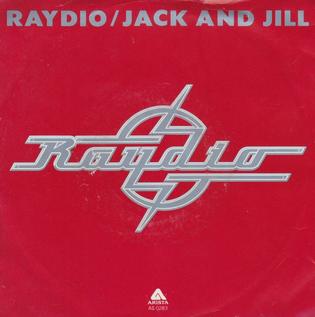
"Jack and Jill" is a 1977 hit song by R&B vocal group Raydio. It was the first single from their debut album Raydio, and became an international top 10 hit. It reached number eight on the U.S. Billboard Hot 100 and number six on the Cashbox Top 100. It reached number five in Canada, number four in Australia, and the top twenty in UK. It was the first of five U.S. top 10 singles by Ray Parker Jr. and/or Raydio.

"Tonight I'm Yours (Don't Hurt Me)" is a song by Rod Stewart, the title track of his 1981 album Tonight I'm Yours. It was one of three singles released from the album. The song was the lead single internationally except for the United States, where it was the follow-up to "Young Turks."

"Uptown Festival" is the debut single by the band Shalamar, released on Soul Train Records in 1977. The song is a medley of ten Motown classics sung over a 1970s disco beat. The radio edit, "Uptown Festival ", became a hit peaking at No. 25 on the Billboard Hot 100, No. 10 on the R&B chart and No. 2 on the Dance chart. It also charted internationally. After the success of the single, Dick Griffey, the booking agent for Soul Train, formed a vocal group, resulting in the first incarnation of Shalamar with Jody Watley, Jeffrey Daniels and Gary Mumford.
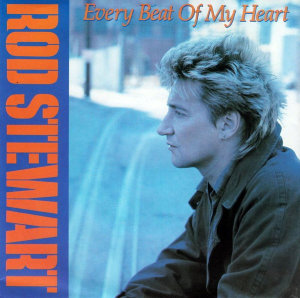
"Every Beat of My Heart" is a song by British singer Rod Stewart. Written by Stewart and Kevin Savigar and produced by Bob Ezrin, the song is a sentimental ballad with lyrics about Stewart returning to the United Kingdom after a long period overseas. The song was included on Stewart's 14th studio album, Every Beat of My Heart (1986), and was released as its second single on 30 June 1986. Music critics were divided on the track, but it became a commercial hit in Europe, peaking at number two on both the UK and Irish singles charts. It was not as successful in North America, stalling outside the top 75 in the United States and Canada.


















